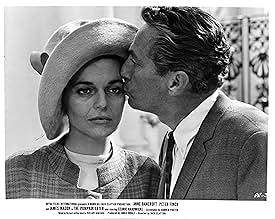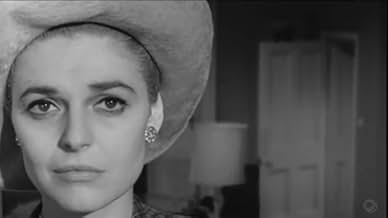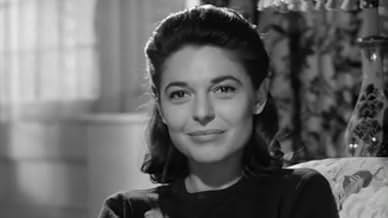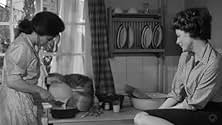IMDb RATING
7.1/10
3.2K
YOUR RATING
Beautiful mother of five Jo leaves the banality of her marriage to second husband Giles to wed her passionate screenwriter lover, Jake Armitage. As her suspicion of Jake's philandering grows... Read allBeautiful mother of five Jo leaves the banality of her marriage to second husband Giles to wed her passionate screenwriter lover, Jake Armitage. As her suspicion of Jake's philandering grows, Jo's sanity spirals.Beautiful mother of five Jo leaves the banality of her marriage to second husband Giles to wed her passionate screenwriter lover, Jake Armitage. As her suspicion of Jake's philandering grows, Jo's sanity spirals.
- Nominated for 1 Oscar
- 6 wins & 6 nominations total
Lesley Nunnerley
- Waitress at Zoo
- (as Leslie Nunnerley)
- Director
- Writers
- All cast & crew
- Production, box office & more at IMDbPro
Featured reviews
I came upon this movie on late night t.v. a few years back. I really love Anne Bancroft and I think that she is, not underrated, but more correctly, overlooked as a great actress. This film is a wonderful study of a marriage in trouble and Ms. Bancroft and the great Peter Finch are so believable as lovers and as a married couple that I wondered why I had never even heard of the film before. I felt their pain - wait, sorry . . . I think someone else named Clinton coined that phrase. But seriously, Anne Bancroft is able to really convey heartbreaking loneliness that you just want to cry or help her in some way. I love movies that engage you thoroughly. If you enjoy movies that make you think and also have a viewpoint about human relations, please try to find this film. An added bonus is a wonderful appearance in a small role by Maggie Smith - certainly a very early one in her career. I really like finding gems like this!
This is my absolute favorite film of all time, and Anne Bancroft's performance is her best. Made in 1964 and set in London, this film tells the story of a woman who is in the middle of her third marriage, to a screenwriter, played by Peter Finch. Her character, Jo Armitage, is a woman who truly seems to find her self-worth and happiness only when she is pregnant and raising children. Once her children become even only slightly older, she seems to lose her sense of purpose, and allows herself to become quite isolated in the world. Her current husband, the screenwriter, doesn't make matters any better for her either.
This is definitely Anne Bancroft's film all the way, and she is breathtakingly beautiful in it as well. Her portrayal of Jo Armitage paints a very lonely, depressed, lost, and in many ways pathetic character...but it is also strangely my favorite performance of Bancroft. Look also for wonderful supporting performances by James Mason and Maggie Smith. This film weaves a disturbing yet very realistic portrait of a bad marriage (some might just say "marriage"), and it should be studied for its acting and its writing. In addition, Georges Delerue's musical score is superb, and I am always searching for the film's soundtrack, but have had no luck. Thanks to beautiful art direction by Edward Marshall, their home interior is also gorgeous...'60's chic. I've seen this film at least 60 times, and never tire of it. It's a quiet little masterpiece.
This is definitely Anne Bancroft's film all the way, and she is breathtakingly beautiful in it as well. Her portrayal of Jo Armitage paints a very lonely, depressed, lost, and in many ways pathetic character...but it is also strangely my favorite performance of Bancroft. Look also for wonderful supporting performances by James Mason and Maggie Smith. This film weaves a disturbing yet very realistic portrait of a bad marriage (some might just say "marriage"), and it should be studied for its acting and its writing. In addition, Georges Delerue's musical score is superb, and I am always searching for the film's soundtrack, but have had no luck. Thanks to beautiful art direction by Edward Marshall, their home interior is also gorgeous...'60's chic. I've seen this film at least 60 times, and never tire of it. It's a quiet little masterpiece.
If "The Pumpkin Eater" has a fault it is that it's so glacial, so cocooned in its world of upper-middle class ennui it may leave you feeling a little drained. Otherwise, this is quite close to perfection. Adapted, superbly and to the extent that he makes it his own, from Penelope Mortimer's novel, by Harold Pinter it tells the story of Jo, (Anne Bancroft), a thrice married mother of several children, (by all three husbands), whose life has started to spectacularly unravel. Jo seems to be the kind of woman who can't stop having children but who doesn't seem cut out for motherhood. Inflicting her existing brood on Jake, (Peter Finch), husband No. 3, does little for their marriage. Jake is an incorrigible philanderer or maybe he just can't stand being at home with a pack of screaming, spoiled brats. Then again he's 'a screen-writer' so his profession offers both glamour and the opportunity for multiple infidelities. Things come to a head when Jo has a mental breakdown 'in Harrods of all places' to quote Jake.
Being Pinter, the film is both elliptical and chilly. It's magnificently made, (the director is Jack Clayton), but you struggle to feel anything for Jo or Jake. It's a world that Pinter and company know well but the rest of us may well feel we are being kept at a distance. But don't let that put you off; if you want your mind engaged at the expense of your emotions you will have a high old time. This is classy, intelligent stuff.
It is superbly cast and played. Some performances don't amount to more than cameos, (Cedric Hardwicke and Alan Webb as Jo and Jake's fathers, Maggie Smith smilingly stealing Jo's husband right from under her nose and best of all, Yootha Joyce as the vindictive and unstable woman in the hairdressers). At the centre there is Bancroft and Finch as the couple struggling through their marriage and they are both marvelous. Finch, in particular, gives Jake an air of likability that may be absent from the script and Bancroft gets Jo's vulnerability spot on. As the husband of Jake's most recent conquest, James Mason is magnificently venomous and his scenes with Bancroft at the zoo and his final scene with Finch, ('You made me wet'), are master-classes in the art of acting.
The movie came out in 1964 and quickly disappeared. Watching it recently with a friend he described it as 'a miserable film' and while I think it a superb film, a near-masterpiece, I know exactly what he means. It is a film distinctly lacking in 'nice' characters and it generates very little warmth. Audiences who, back in the sixties might have admired the film, were unlikely to feel anything towards it and consequently it is seldom revived. A pity because, cold as it is, it is also one of the finest films of its decade.
Being Pinter, the film is both elliptical and chilly. It's magnificently made, (the director is Jack Clayton), but you struggle to feel anything for Jo or Jake. It's a world that Pinter and company know well but the rest of us may well feel we are being kept at a distance. But don't let that put you off; if you want your mind engaged at the expense of your emotions you will have a high old time. This is classy, intelligent stuff.
It is superbly cast and played. Some performances don't amount to more than cameos, (Cedric Hardwicke and Alan Webb as Jo and Jake's fathers, Maggie Smith smilingly stealing Jo's husband right from under her nose and best of all, Yootha Joyce as the vindictive and unstable woman in the hairdressers). At the centre there is Bancroft and Finch as the couple struggling through their marriage and they are both marvelous. Finch, in particular, gives Jake an air of likability that may be absent from the script and Bancroft gets Jo's vulnerability spot on. As the husband of Jake's most recent conquest, James Mason is magnificently venomous and his scenes with Bancroft at the zoo and his final scene with Finch, ('You made me wet'), are master-classes in the art of acting.
The movie came out in 1964 and quickly disappeared. Watching it recently with a friend he described it as 'a miserable film' and while I think it a superb film, a near-masterpiece, I know exactly what he means. It is a film distinctly lacking in 'nice' characters and it generates very little warmth. Audiences who, back in the sixties might have admired the film, were unlikely to feel anything towards it and consequently it is seldom revived. A pity because, cold as it is, it is also one of the finest films of its decade.
I love Mortimer's book and Pinter's script follows it closely. Bancroft has always been my favorite actress and I think this is her greatest performance. I'm glad she flew to England and convinced Jack Clayton to hire her. It is no wonder her talent has been compared to Magnani! Finch and Mason are flawless but it is definitely Bancroft's film. She is so convincing it is as though you can read her character's every thought through her facial expressions. She was robbed of the Academy Award. Yootha Joyce is excellent in a bit part during a beauty parlor scene. The actors in this film are all so good that I feel like I am peering into the lives of real people. Anyone who has been in a relationship with someone who has been unfaithful can relate to this film. I love Clayton's use of flashback to tell Jo's story. I think he was an underrated director. The score by Georges Delerue is beautiful and I wish it were available in his cd catalog.
10andya-5
The Pumpkin Eater, which for many years was my favorite movie, is a neglected masterpiece of the British New Wave. I'm not sure whether its lack of recognition is attributable more to its misanthropic point of view or to Jack Clayton's sparse filmography (he never developed the immediately recognizable personal style required for elevation to the auteur pantheon). It didn't help that initial reviewers badly misunderstood the film -- Dwight Macdonald thought it was a typical "women's film", meant to provide erotic titillation! On the other hand, feminist critics probably weren't eager to defend a film that could be interpreted as anti-abortion propaganda (also a misreading). Perhaps a more mature feminism will reclaim this film.
Admittedly, the movie is difficult to understand on a first viewing -- both because of its intricate flashback structure and its complexities of tone and attitude. It took me several viewings to fully sort out the plot, and several more to realize what I was actually seeing -- a very, very black comedy. In this respect it's worth placing with the darkest works of Evelyn Waugh or Henry Green.
The film catches its participants at the top of their form: Pinter never wrote a better screenplay, Anne Bancroft (arguably) never gave a better performance, Peter Finch certainly didn't, and Maggie Smith and James Mason are deliciously evil in supporting roles. There are too many marvelous moments to list them all, but watch especially for the zoo scene between Bancroft and Mason (who are clearly having a great time) and for the slyly-written scene where Finch learns that his wife is pregnant -- again.
So why is it no longer my favorite movie? My admiration for its technique is unabated, but as I get older I find the film's nasty tone harder and harder to take. There's not an admirable human being in the whole movie -- they're all foolish, duplicitous, or vindictive. I can't live with these people, much as I've enjoyed eavesdropping on them over the years.
Admittedly, the movie is difficult to understand on a first viewing -- both because of its intricate flashback structure and its complexities of tone and attitude. It took me several viewings to fully sort out the plot, and several more to realize what I was actually seeing -- a very, very black comedy. In this respect it's worth placing with the darkest works of Evelyn Waugh or Henry Green.
The film catches its participants at the top of their form: Pinter never wrote a better screenplay, Anne Bancroft (arguably) never gave a better performance, Peter Finch certainly didn't, and Maggie Smith and James Mason are deliciously evil in supporting roles. There are too many marvelous moments to list them all, but watch especially for the zoo scene between Bancroft and Mason (who are clearly having a great time) and for the slyly-written scene where Finch learns that his wife is pregnant -- again.
So why is it no longer my favorite movie? My admiration for its technique is unabated, but as I get older I find the film's nasty tone harder and harder to take. There's not an admirable human being in the whole movie -- they're all foolish, duplicitous, or vindictive. I can't live with these people, much as I've enjoyed eavesdropping on them over the years.
Did you know
- TriviaThis movie never explains its title, which refers to a traditional children's rhyme: "Peter, Peter, pumpkin eater/Had a wife, but couldn't keep her/So he put her in a shell/And there he kept her very well." This serves as the epigraph of Penelope Mortimer's original novel.
- GoofsIn the shot after Jake pours out his drink on Conway, the film is being run backwards for some reason, as the smoke from the cigarette clearly indicates.
- Quotes
[last lines]
Jo Armitage: Yes. I'll have one.
- ConnectionsFeatured in James Mason: The Star They Loved to Hate (1984)
- How long is The Pumpkin Eater?Powered by Alexa
Details
- Release date
- Country of origin
- Language
- Also known as
- The Pumpkin Eater
- Filming locations
- Turville, Buckinghamshire, England, UK(Cobstone Windmill - the Armitage's country house with views of town below)
- Production company
- See more company credits at IMDbPro
- Runtime
- 1h 58m(118 min)
- Color
- Aspect ratio
- 1.85 : 1
Contribute to this page
Suggest an edit or add missing content






































